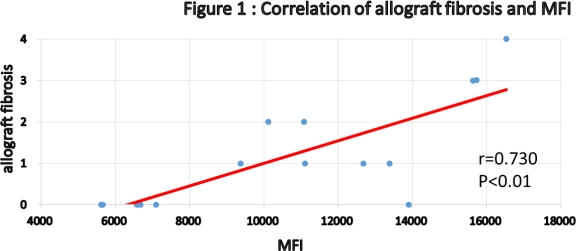The Higher MFI of De Novo Donor-Specific Anti-HLA Antibodies Is Correlated With Graft Fibrosis Progression in Living Donor Liver Transplantation
1Gastroenterological Surgery 1, Hokkaido University, Sapporo, Japan
2Transplant Surgery, Hokkaido University, Sapporo, Japan
3Division of Organ Transplantation, Hokkaido University Hospital, Sapporo, Japan.
Meeting: 2015 American Transplant Congress
Abstract number: 399
Keywords: HLA antibodies, Liver transplantation, Risk factors
Session Information
Session Name: Concurrent Session: Liver: Living Donors and Partial Grafts
Session Type: Concurrent Session
Date: Tuesday, May 5, 2015
Session Time: 2:15pm-3:45pm
 Presentation Time: 2:27pm-2:39pm
Presentation Time: 2:27pm-2:39pm
Location: Room 115-AB
Background. It has been shown that the development of de novo donor-specific anti-HLA antibodies (DSA) is associated with poorer graft outcome in kidney transplantation. However the roles of de novo DSA in liver transplantation (LTx) are controversial. This study aims to identify the risks of de novo DSA on advanced graft fibrosis in living donor liver transplantation.
Methods: From 238 recipients underwent living donor LTx (LDLTx) in Hokkaido Univ. from 1997 to 2013, we analyzed 41 positive crossmatch recipients following LDLTx. The anti-HLA antibody was assessed with LABScreen® single antigen beads test. Graft fibrosis was evaluated by histopathological examination of biopsy samples and staged by METAVIR scoring system (F0-4).
Results: De novo DSA were detected in 15/41 (36.6%) recipients on 1231 days in median (range: 360-5367) after LDLTx. In 13/15 (86.7%) recipients developing DSA, the antibodies to class II Ags (DQ 53.8%, DQ&DR 38.5%, DR 7.7%) were detected. Also 12/15 (75%) recipients had episodes of acute cellular rejection (ACR) within a year after LTx. In addition, 9/15 (60%) recipients developed the graft fibrosis (>F1). 5/9 developing fibrosis are pediatrics. In 4 adults with advanced graft fibrosis, 2 cases were HCV positive. Of note, the higher values of MFI in DSA(+) recipients were significantly correlated with the rate of graft fibrosis progression (r=0.789 p<0.001). Also both the longer cold ischemia time (CIT) (>60 mins) and ACR episodes in the presence of de novo DSA accelerated the graft fibrosis (>F2) (p<0.05).
Also both the longer cold ischemia time (CIT) (>60 mins) and ACR episodes in the presence of de novo DSA accelerated the graft fibrosis (>F2) (p<0.05).
Conclusion: The higher MFI of DSA is significantly associated with accelerated liver allograft fibrosis. For high risk DSA(+) recipients, immunosuppressive strategies to reduce the anti-HLA antibodies should be considered.
To cite this abstract in AMA style:
Fukasaku Y, Goto R, Emoto S, Kawamura N, Koshizuka Y, Takahashi T, Ota M, Aoyagi T, Yamashita K, Taketomi A, Shimamura T. The Higher MFI of De Novo Donor-Specific Anti-HLA Antibodies Is Correlated With Graft Fibrosis Progression in Living Donor Liver Transplantation [abstract]. Am J Transplant. 2015; 15 (suppl 3). https://atcmeetingabstracts.com/abstract/the-higher-mfi-of-de-novo-donor-specific-anti-hla-antibodies-is-correlated-with-graft-fibrosis-progression-in-living-donor-liver-transplantation/. Accessed February 14, 2026.« Back to 2015 American Transplant Congress
